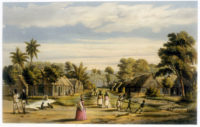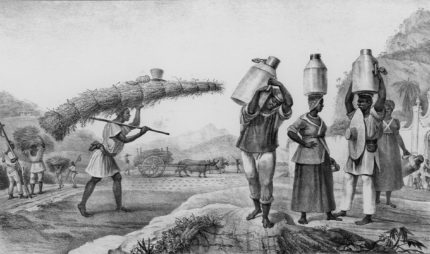 Funded by a grant of $1.47 million from the Andrew W. Mellon Foundation, Michigan State University will create a massive database that brings together scattered information about enslaved people as a priceless research hub for scholars and the public alike. The project, entitled Enslaved: The People of the Historic Slave Trade, will be one-stop-shop for people seeking slave data for academic, genealogical and personal interest purposes. They will be able to search for specific individuals, create charts, map routes and analyze demographic data.
Funded by a grant of $1.47 million from the Andrew W. Mellon Foundation, Michigan State University will create a massive database that brings together scattered information about enslaved people as a priceless research hub for scholars and the public alike. The project, entitled Enslaved: The People of the Historic Slave Trade, will be one-stop-shop for people seeking slave data for academic, genealogical and personal interest purposes. They will be able to search for specific individuals, create charts, map routes and analyze demographic data.
MSU has long been at the forefront of African studies — US News and World Report ranked its African history graduate program the best in the country — and they are eminently equipped to combine scholarship with digital resources that students, researchers and anybody else who wants to delve deeper into the subject can use. This is the raison d’etre of MSU’s Matrix: The Center for Digital Humanities and Social Sciences which will be one of the databases linked together with other world-class databases to create the Enslaved tool.
“‘Enslaved’ brings new digital tools and analytical approaches to the study of African slavery and the Atlantic slave trade,” said project co-investigator Walter Hawthorne, professor and chair of MSU’s Department of History. “By linking data compiled by some of the world’s foremost historians, it will allow scholars and the public to learn about individuals’ lives and to draw new, broad conclusions about processes that had an indelible impact on the world.” […]
The partner projects in phase one are “African Origins and Voyages: The Trans-Atlantic Slave Trade Database” led by David Eltis, professor emeritus, Emory University, and Paul Lachance; “The Slave Societies Digital Archive” led by Jane Landers, Vanderbilt University; “Dictionary of Caribbean and Afro-Latin American Biography” and “Dictionary of African Biography and African American National Biography” led by Henry Louis Gates Jr., Steven Niven and Abby Wolf, Hutchins Center for African and African American Research at Harvard University; “Freedom Narratives” led by Paul Lovejoy, York University; “Legacies of British Slave-Ownership” led by Keith McClelland, University College, London; and “The Liberated Africans Project” led by Henry Lovejoy, University of Colorado Boulder; and “Slave Biographies” led by Daryle Williams, University of Maryland.
The first phase of the project is expected to about 18 months. The goal is develop a functional framework that proves that it’s even possible to link the eight online collections in the initial pilot into one searchable, cross-navigable, publicly accessible database. After that’s done, they can get down to the real nuts and bolts of getting so many moving parts to work together in harmony. It’s going to be a while, but the results could be groundbreaking. Dean Rehberger, director of Matrix and one the leaders of the project:
“In bringing together data from a number of highly successful projects, we have the opportunity from many small threads of data to weave together lives of enslaved individuals once thought lost to history.”

Indeed, the hole trade in humans and ivory is often misunderstood, as in most of *those* countries, there always is a local business partner, and often deals are bad ones.
Moreover, bookkeeping is in some cases the more accurate one over there. Here, a prerequisite would be an ability to read and write from right to left.
Instead, officials tend to press the wrong buttons and probably cannot spill at all.
“The People of the Historic Slave Trade” seems to encompass the error that there was only one slave trade. History is much, much sadder than that.
Ah yes, the Historic Slave trade as opposed to the non-Historic Slave Trade. Such is the nature of education is that it tends to encourage the thinking that this is this, and that is that.
Good project though.
It’s pitch as some sort of “scholarly” thing but it will, in reality, be yet more racist bullshit from the propaganda party.
It’s pitch as some sort of “scholarly” thing but it will, in reality, be yet more racist b ullshit from the propaganda party.
Damn those Republicans, pgauge!